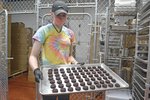



Lansing may never again have paczki like Sostine and Mena Castriciano could churn out at Roma Bakery and Deli. More than a century of combined baking experience with artisanal Italian goods can be hard to come by, and perhaps even more difficult to replace once it is gone.
The craft cannabis cuisiniers at Noble Road, however, are trying their best. The new occupants of the longtime home of Roma Bakery, at 428 N. Cedar St., in Lansing, are even using the same countertops, mixers and commercial ovens that made the Castriciano family recipes famous — though these particular confections are filled with a bit more than just ricotta cheese.
Noble Road produces an array of concentrates and cannabis-infused baked goods that are sold at Lume Cannabis Co., with shops in Owosso and Jackson, and nearly 150 other medical and recreational pot shops across Michigan. A new line of gummies launched this week. Tinctures are planned for later this year.
“I’m from Lansing. I’ve always known about this place,” said owner Travis Wilson, who bought the building — with help from some friends — in 2019 and launched Noble Road last spring. “It’s just all sort of coincidental that it came together the way things did. It’s a great location.”
The Castricianos, who started the bakery as young Italian immigrants in 1969, announced Roma was closing in August 2019. The family had tried to sell the bakery for three or four years, but the plans just never came together. That was until the marijuana industry started to boom.
This year, Lansing is home to hundreds of licensed marijuana facilities — growers, retailers, testing labs, transporters. And processors like Noble Road also help keep the edibles flowing.
Dozens of employees, each wearing a tie-dyed t-shirt as a uniform, helped bring Roma Bakery back to life last Friday. A commercial cookie-making machine oozed carefully weighed chunks of dough into molds. Trays of gummies and brownie bites were piled across the production floor.
Sweet cream was being mixed with flour and cannabis extract in Roma’s old mixers. From there, they’re slid into the same oven that used to produce thousands of paczki for Fat Tuesday.
“A lot of this equipment is original to Roma,” Wilson explained as he gave a tour last week.
Wilson is a former hospice nurse who noticed the benefits of cannabis firsthand on his patients. He doesn’t have a Michelin star or much culinary training at all, he said. Instead, his business is driven purely by a longstanding passion for the recreational and medical benefits of the plant.
His journey into the industry began with managing a small grow operation just outside Lansing. His nights were spent reading everything he could about marijuana. He immersed himself in the cannabis community, spending every minute consumed by his newfound obsession. Roma “serendipitously” hit the market just as Wilson was ready to expand into the processing industry.
Oh, and the location of Wilson’s first hands-on cultivation project near Lansing? Noble Road.
“A lot of other brands are coming in from outside the state of Michigan, and we’re a Michigan-owned company. We’re a small, family-owned business. The people that work in this facility are like a very tight-knit little family,” added Sales and Marketing Director Alyssa Price.
Since December, Michigan has reported about $15 million in edible sales statewide every month. It routinely trails behind sales of flower and vaporizer cartridges, but market research suggests that cannabis-infused confections represent a growing segment of the industry.
Research from BDS Analytics suggests that the entire North American edible market tracked about $1.5 billion in sales in 2018, which is predicted to climb to $4.1 billion by next year alone. Headset reports that sales of adult-use and medical edibles climbed by 60% across seven markets — to $1.23 billion in 2020 from $767 million in 2019. Edibles also experienced a 14% rise in Michigan’s market share in 2020, reflecting a rising interest in non-smokable alternatives.
Cookies and brownies often serve as the entry point for customers into the newly legalized market, Price explained. They contain very specific concentrations of THC for easy dosing. They’re also discreet, so customers don’t walk around smelling like a freshly smoked blunt.
Noble Road also uses an ingredient that’s rarely found in other gummies or cookies: Hash rosin.
The vast majority of Michigan’s processors purchase bulk flower and trim which is distilled into a sterile sort of concentrated oil known as distillate. That process — which often uses low-grade bud — separates the THC from the plant, as well as from the full spectrum of cannabinoids.
Hash rosin, on the other hand, is all about preserving the original terpene and flavor profiles of the plant. After harvest, it’s frozen, pressed and processed in its most primal form. The result is an entourage of psychoactive components that make for a much more balanced sort of high.
“When the state started to pinch the supply, it was really hard to get any distillate. We just didn’t have the set up to do our own distillation, so we decided to perfect our recipes with hash rosin,” Price explained. “It’s just a premium way to consume cannabis. No chemicals touch the plant.”
The remaining ingredients are simple — eggs, butter, flour, vanilla, salt and cocoa powder. The newly released “fruit gems” are also made using natural fruit ingredients and herbs like ginger.
“There’s something about having that real fruit in there that makes it a better high,” Wilson said.
Noble Road has also transformed itself into a business incubator, leasing production space to two other companies focused on the edible market: Northern Lights FX and Fwaygo. Northern Lights just released its first line of cannabis-infused chocolates last week. Dozens of Fwaygo boxes were stacked on tables at Roma last week. They moved in “like yesterday,” Wilson said.
Officials at all three companies pointed to the city of Lansing — with easy access to markets in Detroit and Grand Rapids — as a growing focal point of the cannabis industry in Michigan.
Mike Thackeray, the owner of Northern Lights, also brings no culinary experience to the table. He entered the industry as a caregiver, only developing his chocolate products after realizing how many other edibles were inconsistent in quality and had contained varying levels of THC.
His chocolate bars — which come in six varieties for six distinct effects — use ingredients imported from France. Some have caffeine. Others have herbal remedies for relaxation. One of them, with muira puama and ashwagandha root extract, is designed to enhance sexual arousal.
“We spent a lot of time doing market research, going to other states to see what everyone else was doing,” Thackeray said. “We developed these for six types of effects. It’s all fair trade. We wanted the best chocolate we could find and to make a better product than what was out there.”
Thackeray’s favorite is the caffeine-infused “daytime” bar, which he described as a “hippy speedball.” Those were just delivered to Pure Options and Edgewood Wellness last week.
“Everybody talks sativa and indica, but when you’re going into the shop, many new customers have never consumed cannabis before. They don’t want that couchlock. They want to know what sorts of effects they’re going to be feeling. This is designed for them,” Thackeray added.
The effects of each chocolate bar, for the most part, work exactly as advertised. Check out this week’s “Lansterdam in Review” column for more detailed information about the edible products.
Perhaps this story also shouldn’t be shared with the Castricianos, who never publicly revealed that Nobel Road bought the building in 2019 while Wilson and his team sent out press releases announcing the acquisition. Why the secrecy? “It’s definitely the stigma on the industry,” Wilson added. “I don’t think they were exactly proud to see what was going to be done with the place.”
1 comment on this item Please log in to comment by clicking here
Support City Pulse - Donate Today!
filocastriciano
Lansing City Pulse:
We read your article on Noble Road. We were dismayed to find you use our name and business to weave the story on Noble Road in with ours. We are not involved with this business. We do not appreciate the use of our business to advertise for an industry we do not support. We have worked for over half a century to build our own name, credentials, and customer base. We feel your article cheapens what we have worked towards. While we like Travis and his employees as individuals, we do not advocate for the cannabis industry. On top of that, a number of our former customers, are confused by this article and called us thinking Roma Bakery and Deli has come back to sell cannabis products. Your article is misleading and inappropriate for Roma Bakery and Deli. Please correct this and do not use our name, product, or business in connection with our former building.
Thank you,
Sostine and Mena Castriciano
Thursday, April 15, 2021 Report this